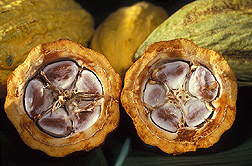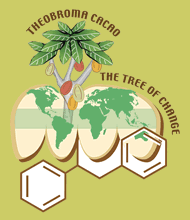This page has been archived and is being provided for reference purposes only. The page is no longer being updated, and therefore, links on the page may be invalid.
|
|
Cacao Symposium Tackles Chocolate Production Problems
By Alfredo Flores
February 9, 2006
Agricultural Research Service (ARS) scientists have located genetic markers for resistance to a major disease of cacao trees, the source of seeds for cocoa and chocolate.
The scientists found the markers for resistance to witches’ broom, a disease caused by the fungus Moniliophthoraperniciosa, the main killer of Theobroma cacao trees. They are presenting this and other research findings during a biennial Symposium on Cocoa hosted by the National Academy of Sciences on February 9-10 in Washington, D.C.
Witches' broom penetrates cacao stem and fruit tissue, inhibits formation of seed pods and destroys mature pods. Two other major cacao-production problems being addressed by ARS researchers are frosty pod and black pod rot.
|
|
The symposium, titled "Theobroma cacao: The Tree of Change," features presentations on cocoa- related aspects of plant and biomedical science, sustainable agriculture, nutrition, medicine and anthropology, along with round-table discussions on problems and issues facing cocoa-growing regions of West Africa, East Asia and the Americas.
ARS geneticist Ray Schnell will describe recent progress in the ongoing cacao breeding program. Schnell works at ARS' Subtropical Horticulture Research Station (SHRS) in Miami, Fla., where he and colleagues are unraveling the genome of T. cacao.
Traditional cacao breeding programs have been only marginally successful in producing disease- resistant material that also shows suitable commercial characteristics. Since 1999, the SHRS, in collaboration with Mars Inc., of Hackettstown, N.J., have been studying ways to speed up cacao breeding while reducing costs.
Already, scientists have succeeded in genetically mapping T. cacao species, segregating them according to resistance, and identifying genes that influence resistance and productivity. Thus, the use of new genomic technologies will help ensure sufficient cocoa to meet world demands.
ARS Deputy Administrator Judith St. John; Wanda Collins, director of the ARS Plant Sciences Institute; and Lyndel Meinhardt, research leader of the ARS Sustainable Perennial Crops Laboratory, Beltsville, Md., are co-chairing symposium events.
ARS is the chief scientific research agency of the U.S. Department of Agriculture.


